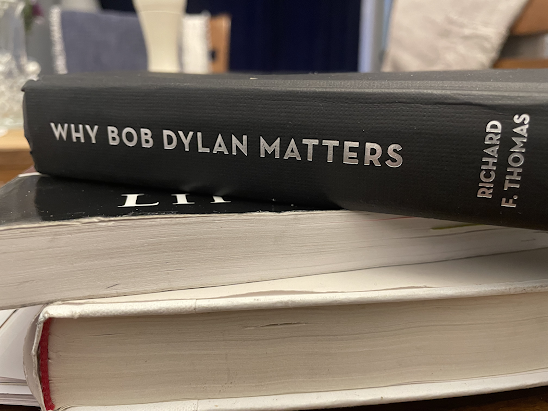Three Things from Edmonton -- Episode 123: classics, filling stations, going Dutch
Three Things, Episode 123:
1. Classics
From a table at the back of the Starbucks on Bellerose Drive in St. Albert, I wrote an email to a perfect stranger last week. Richard F. Thomas is a classics professor in the green pastures of Harvard University. I was reading his book Why Bob Dylan Matters. He mentioned a Dylan concert in Taormina, Sicily, in 2001. In my note, I hazarded my theory that Mark Knopfler, in his song Lights of Taormina, is singing about Dylan.
Dylan is the unidentified “he” in the song. Knopfler sings “he” wants to know if anyone has seen her. I hear, if you see her, say hello. Knopfler sings seems like another lifetime when “he” rambled across the shore, and I hear ‘twas in another lifetime and circled by the circus sands. Knopfler sings she used to call “him” sweet señor, I ask can you tell me where we’re heading, Lincoln County Road or Armageddon? When Knopfler sings “he" hears the chimes of history, I see the hypnotic splattered mist that was slowly lifting. When Knopfler says “he’s” been so long a wanderer, I think Odysseus and troubadour Dylan’s never-ending tour. By the time Knopfler’s song is over, I feel it’s the ancient Dylan sitting at a table, staring down at the lights of the town, thinking thoughts of eternity. I hit return.
A couple of hours later, the professor replied.
He said he listened to Taormina three times, found the song beautiful and mysterious and appreciated my noticing the possible intertexts. He was not convinced by my theory, but said, “I’ll keep thinking about it, and the fact is if you hear Dylan there that is good enough. It certainly could be so. The great thing about such art is that ambiguity allows us to see what occurs to us!”
He then casually gifted the observation that Knopfler’s one-time duet partner Emmylou Harris wrote a song about crossing the Rubicon long before Dylan’s own Crossing the Rubicon on his recent Rough and Rowdy Ways album. Rubicon from the Latin meaning reddish, a reference to the ruddy river Caesar crossed in 49 BC, and a new way to think about Emmylou’s Red Dirt Girl’s Lillian, who crosses a line just a little southeast of Meridian, never to return.
There is nothing more alive than the dead.
2. Filling stations
I stopped at the Circle K after pedalling 90 blocks or so down the 167 Avenue shared use path from 142 Street. I love wheeling into convenience stores on my rides, picking up fuel before heading back to the road. Last summer, we were on the road from Tulsa to Oklahoma City. Our friend David was driving. We stopped for gas at the Phillips 66. That was pretty much the highlight for me, and we saw great things and met great people in OKC! Same thing on my bicycle. I love the feeling of turning off, slowing down, taking a breather, watching traffic go by, picking up a snack or a soda, crossing paths with complete strangers, reading meaning into what they say and, then, getting back going again. You can’t get back going again if you don’t stop.
At the Circle K, I picked up a BioSteel energy drink and was back standing next to my bike, taking a long swig, when buddy walked up to me, cigarette between his teeth, ash falling to the sidewalk.
“Do those give you energy?” he asked, coughing.
“I’m not quite sure, but they taste good,” I said, “that’s the main thing for me. I’m a bit of a sucker for advertising.”
“I see them on hockey, so, I was wondering, McDavid, you know,” he said. “Have a good ride, man.”
I am wide open to the world at waystations. Airports, train stations, ferry terminals, too. They are places where we didn’t start, and they are places where we haven’t arrived. They put us in the action. They are where we can see clearly that we are travellers—pilgrims the term once was, pilgrim related to the Latin word for foreign in the sense of abroad or afield. And they still can be the places where in our small talk we comfort each other on the journey. That’s how the “have a good ride, man” hit me at the Circle K on 59A Street in northeast Edmonton last week.
Shelagh and I were having a meal at OTTO on 95 Street. It’s our favourite joint. Ed, who owns the restaurant, wasn’t there that night. He was at home, recovering, getting used to his new knee. What might a guy with a new knee need to lift his spirits until the pain is worked out? We searched our phones for inspirational Dutch sayings, and found this one, which Shelagh texted to him:
Opgeven kan morgen ook nog.
Rough translation, I think: You can always give up tomorrow!
That’s a fine a concoction of almost equal parts fatalism and perseverance, with a dash of bitter humour. It smuggles in a basic question: Do I keep going? Knowing that quitting is an option can, in a strange way, at certain times, be soothing. The saying would make no sense if we weren’t in some way free and if we didn’t have the mysterious ability to imagine things as they now aren’t. It summons a sense of now and then, present and future, and it places each of us squarely, electrifyingly, even, on stage right here and right now. What do I do, now, while time goes by?
The bird that starts solo-ing outside our bedroom window at about 4 in the morning, skies heavy with smoke or not, has one answer. The Dutch have already written the lyrics.
Thanks for being out there, friends.











Comments
Post a Comment